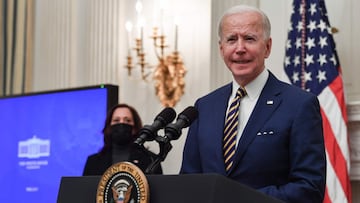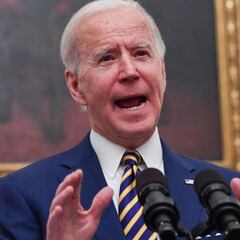Third stimulus check: update and rundown on Biden's $1.9 trillion relief bill
After signing a number of executives orders President Joe Biden is hoping that the American Rescue Plan will provide the covid-19 economic relief needed.


Before he had even taken office President Joe Biden had announced details of a new coronavirus relief bill aimed at supporting those who are most vulnerable and kick-starting the American economy. Since entering the White House Biden has introduced some policy changes through the use of executive orders but that large-scale package, known as the American Rescue Plan, remains his number one goal.
Biden has promised decisive action to both limit the spread of the coronavirus and to reverse the damage it continues to do to the United States’ economy. When announcing the proposal Biden said the $1.9 trillion package would address the “growing divide between those few people at the very top who are doing quite well in this economy — and the rest of America.”
Update on Biden’s coronavirus relief bill
When Biden proposed the package from Wilmington, Delaware on 14 January he did so just weeks after Congress had passed the $900 billion emergency covid-19 relief bill in late December. Given the size of the new package, which would make it the largest stimulus bill since the CARES Act was signed last March, it has to be passed in Congress before Biden can sign it into law.
President-elect Biden’s $1.9 trillion American Rescue Plan will contain the virus, rescue the American economy and put money directly into the pockets of working families, communities, and small businesses impacted by the pandemic.
— The White House (@WhiteHouse) January 17, 2021
However for now there are other priorities in the Capitol with the new President needing to have his cabinet picks confirmed by the Senate. There is also the small matter of former President Donald Trump’s impeachment trial, which is scheduled to begin on the week starting 8 February. With all this going on it will take time for Biden’s proposal to even reach the floor.
Republican lawmakers publically oppose Biden’s American Rescue Plan
Before the bill can be signed into law it needs to be passed by Congress, in both the House of Representatives and the Senate. The Democrats hold a healthy majority in the House but their advantage in the Senate is razor-thin; with 50 Senators for both the Republicans and the Democrats, Vice President Kamala Harris has the deciding vote.
However Senate rules require a 60-vote supermajority for major legislation like this to pass meaning that Republican lawmakers would have to cross the aisle. So far there does not appear to be much appetite for that amongst the GOP and several moderate Republicans have spoken out against Biden’s bill.
Susan Collins dismissed massive stimulus package. “We just passed $900 billion worth of assistance; why we would have a package that big now? Maybe a couple of months from now the needs will be evident and we will need to do something significant. But I'm not seeing it right now”
— Manu Raju (@mkraju) January 22, 2021
Senator Pat Toomey of Pennsylvania has issued a statement in recent days saying: “Blasting out another $2 trillion in borrowed or printed money — when the ink on December’s $1 trillion aid bill is barely dry and much of the money is not yet spent — would be a colossal waste and economically harmful.”
Another GOP Senator, Rick Scott of Florida, said that while he will “continue fighting for targeted relief,” he will “not stand by and let failed liberal policies be used to mortgage our kids’ and grandkids’ futures.”
What is in Biden’s covid-19 stimulus package?
Upon announcing his American Rescue Plan Biden made clear that he hoped to provide meaningful assistance for people who are suffering due to the economic fall-out of the pandemic.
“During this pandemic, millions of Americans, through no fault of their own, have lost the dignity and respect that comes with a job and a paycheck,” he said in a press conference last week. “There is real pain overwhelming the real economy.”
Stimulus checks, extension of unemployment benefits, and a $15 minimum wage — here’s what’s in Pres.-elect Biden’s $1.9 trillion ‘American Rescue Plan’ pic.twitter.com/4UDbTa4EFA
— NowThis (@nowthisnews) January 15, 2021
The headline inclusion of a new round of stimulus checks was seen as a positive move by many although some felt that it should have been the full $2,000, rather than a $1,400 ‘top-up’ payment actually included. The package also includes federal funding to cover $400 weekly unemployment benefits through September 2021, a considerable increase on the existing provision.
Related stories
To help tackle the pandemic itself Biden’s plan would see $50 billion put towards improving the nationwide covid-19 testing system, with another $20 billion to implement a new national vaccination programme to be ran in partnership with states, localities and tribes.
There is also billions in federal spending for children with $170 billion to go to K-12 schools and institutions of higher learning and tweaks to Child Tax Credit to increase the annual amount offered to $3,000 per child ($3,600 for children under the age of six).

